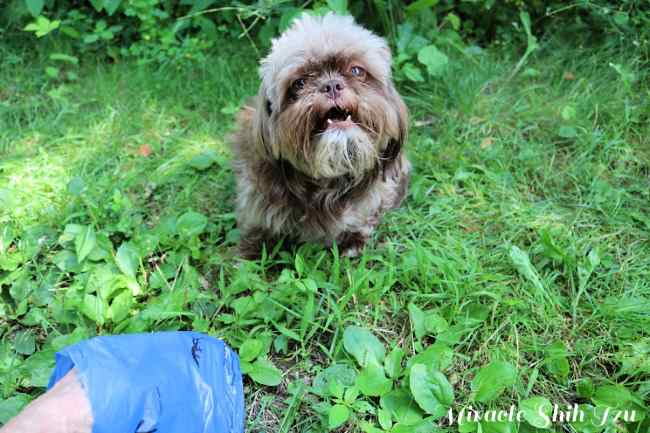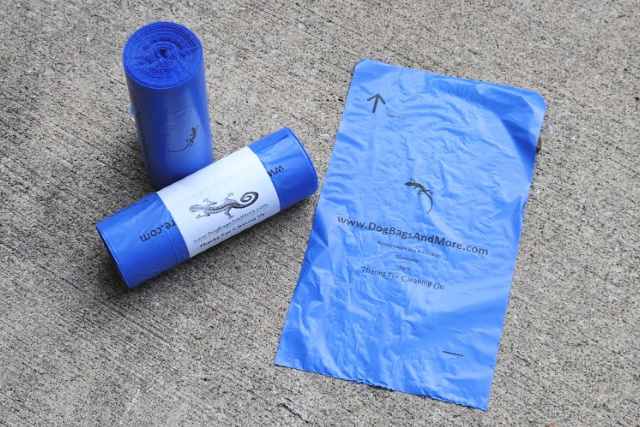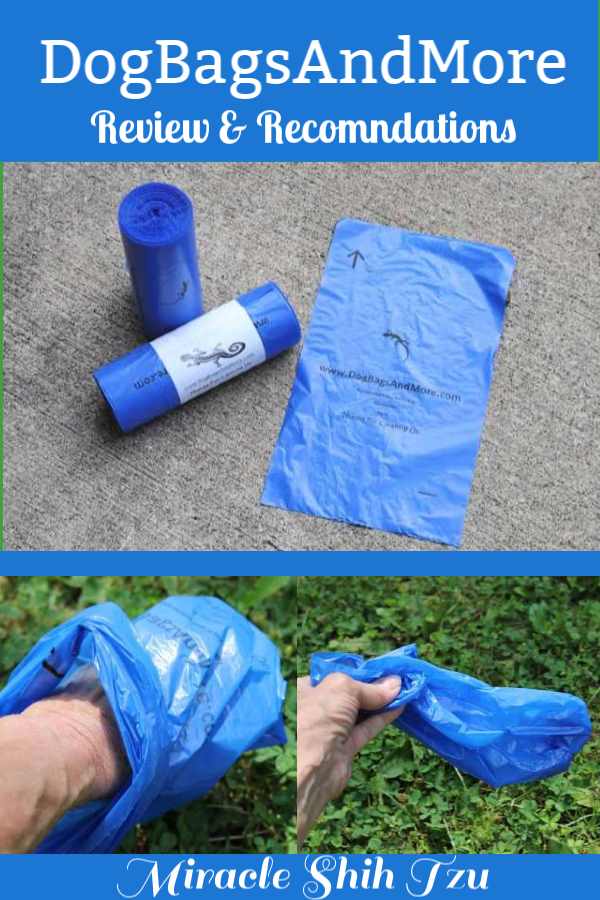- Home
- Caring Intro
- Dispose of Dog Poop
How to Dispose of Dog Poop in an Environmentally Friendly Way
Dispose of Dog Poop by Janice A. Jones |Last Updated 06-09-2021
- Sponsored -
I want to dispose of dog poop in an earth friendly way. Do You?
Now, I know this is not necessarily the most sexy topic to discuss, but we must admit that our Shih Tzu dogs produce waste that needs removing, even if it is not nearly as burdensome as say, a Great Dane's doo.
As dog owners, it is our responsibility to take care of our four-legged baby and that includes pick up after them, rain or shine.
Why Worry About Disposing of Dog Poop?

So you have a standard size Shih Tzu that poops two or three times a day. I'm hearing you say, "so, how could that small amount of poop cause any problem to the environment?"
The problem is not so much the size but the cumulative effect that occurs when dog owners won't clean up after their pets, whether it is on their own property or a nearby park.
Poop left on the ground can be dangerous for a number of reasons:
- Poop may contain parasites such as worms or one celled organisms that release their eggs through poo. Another dog that comes along can pick up these parasites infecting itself and others the he comes in contact with.
- Not only can contaminated poop infect other dogs, but some parasites found in poop can infect children and people causing illness and discomfort. Hookworms, roundworms and protozoan parasites like giardia have found their way from dogs to people. Even e-coli and tapeworms can be passed on to people. This type of transmission that causes illness is called a zoonotic disease. Dogs are associated with more than 60 zoonotic diseases
- Poop left on the ground can wash away during a storm and get mixed up with storm drain off that can contaminate rivers, streams, lakes or other bodies of water.
- Even poop that makes its way to the landfill can produce methane. Methane is a really potent greenhouse gas. One ton of dog poop will actually produce 450 kilograms of methane. If all dog poop ends in the landfill that's a huge amount of methane contributing to climate change.
How to Dispose of Dog Poop
There are several methods that people use to dispose of dog poop:
Which Method to Use?
Which method you choose depends on your own circumstances, resources and amount of time you have to devote to the removal process. Each of the following is is environmentally friendly in its own way.
Dispose of Dog Poop Using Scoop and Bury
The Scoop and Bury method makes use of a pooper scooper or biodegradable poop bags and some form of a waste digester such as the Doggie Dooley.
This is a complete system that you set up in your backyard. After collecting the poop, you open the lid, place the poop in and then add an enzyme and water once a week. Eventually the waste liquifies and returns to the ground.
- Pros
- Environmentally friendly: This system is self contained and does not connect to a sewer system or septic tank.
- You can purchase a ready made device or make your own.
- Relatively inexpensive
- Good Choice for removing poop from your garden or property using a pooper scooper.
- Works well for families with access to outdoor yards.
- One or two dog families may find this system meets their needs.
Cons
- Must maintain the system
- Requires taking poop from home and burying; Maybe more time consuming than other methods
- Not practical in all climates
- Not efficient in multi-dog households
- Must live in a location where there is access to a personal outdoor space
- Must still rely on poop bags when out and about
Dispose of Dog Poop Using Scoop and Compost
Composting is a green method that turns organic wastes into useful fertilizer. If you already compost your lawn and kitchen wastes, this may be a good option for you. But remember, if you are looking for fertilizer for your edible plants, this won't work. The fertilizer that is produced with dog poop can only be used on non-edible plants.
Pros
- Provides a source of fertilizer for trees and shrubs
- A good option for someone already composting
- Suitable for recycling poop from your property via a pooper scooper
- Does not require the use of bags if pooper scooper is used.
- Cons
- Like worm farming, this method is labor-intensive
- Compost cannot be used for vegetable gardens or fruit trees
- Impractical for dog walks; you will still need to use a poop bag on walks
Dispose of Dog Poop Using Scoop and Flush
This is a simple method for disposing of dog poop straight down the toilet. It will work for families that have one small dog but may overload the system for a multi-dog household.
Flushing without the bag may be the best way to dispose of dog poop because the poop becomes part of the sewer system and makes its way to the water treatment plant.
- Pros
- The safest and fastest way to remove poop.
- Poop is flushed away where it is broken down along with other human waste.
- Easy, quick,
- Good for families with one Shih Tzu dog
- Cons
- Poop must be small and disposed immediately when soft.
- Poop must be fresh and not allowed to harden.
- Flushable bags used to gather poop may clog the system
- Not the best option for older homes with old systems and pipes
- Requires you pick up the poop either by bag or scooper.
Dispose of Dog Poop by Giving it to the Worms
Worm farming may be the most green way to get rid of dog poop, and can be done even if you don't have a garden. You can also dispose of your kitchen waste such as peelings and cores. Worms eat the waste, digest it eliminate the odor. What's left can be used to fertilize your garden, but never on plants intended for food.
Pros
- Similar to composting, but different in you allow worms to work for you.
- Good choice if you are already composting kitchen and garden scraps
- Very inexpensive
- Produces fertilizer for shrubs and trees
Cons
- Requires ongoing work
- Fertilizer that is produced cannot be used on vegetable or fruit plants or trees.
Dispose of Dog Poop by Scoop and Toss
This method makes use of biodegradable poop bags that will degrade overtime at the landfill. Simply scoop up the poop and place in your garbage container.
The poop will make its way to the landfill, but the bag and contents will degrade faster than the average plastic bag returning the contents to water, CO2 and biomass.
Pros
- Convenient, especially when walking your dog
- Easy to dispose of poop and reduce odors
- Scoop, tie the bag and dispose of in the garbage
- Useful for families with multiple dogs and those with large breed dogs
Cons
- Some bags are thin and tear easily
- Some bags are challenging to remove from the roll
- Some bags are difficult to open easily
- Some bags contain scents that may cause allergies in some people
- Some areas will not pick up poop with the regular refuge
Which Method is Best to Dispose of Dog Poop?
Each method has its pros and cons and no one method is superior to the others. It boils down to your lifestyle, where you live, and what's right for you.
Biodegradable Poop Bags

An environmentally friendly alternative to disposing of dog poop involves the use of biodegradable poop bags.
Biodegradable poop bags are plastic bags that have been altered so they can degrade or biodegrade quickly in a landfill or compost pile. Not all biodegradable bags are the same, however, so you need to find one that has been manufactured to do what it claims to do.
What to Look for in Biodegradable Bags?
If it is your job to dispose of dog poop, you may be interested in learning a little more about biodegradable dog poop bags.
1. Bag Strength
Have you ever tried to use thin, limp bags to pick up poop? You know, those bags that won't tear easily from the roll, but tear quite well with the help of your fingernail?
The bag needs to be sturdy and strong enough to hold its contents without leaking or accidentally being poked through with long fingernails. This means that the plastic should be thick enough to get you back home without any undue mess. Some of the cheaper bags are very thin and break even before you use them to pick up poop.
2. Size of the Bag
The size of the bag matters but does depend on the size of your dog and your hand. Shih Tzu dogs are small and so you won't need the giant bags recommended on some sites. But you still need a bag that will fit over your hand and can easily pick up all the feces with one swift scoop.
I prefer bags that are at least 13 inches by 9 inches at the minimum. That's 23cm x 33cm. The poop bag should also be large enough to tie off the top to eliminate odors.
3. Detachment from the Roll
All of the poop bags I have encountered come in a continuous roll. Bags are then torn apart or detached from the roll for individual use. If the bag doesn't easily tear off the roll, you will be left fumbling with the roll. For me, speed is paramount. I want to remove poop before other dogs walk in it or worse, decide it might make a tasty treat.
Cheaper bags are difficult to tear from the roll, and sometimes the bag rips in the process. Picking up dog poop is not my favorite chore and and manipulating a poorly made roll of bags just adds to my frustration. How about you?
4. Materials
By now, you might be wondering what the difference is between biodegradable and compostable bags. Understanding the terms used to describe plastic will help you know what you are getting. Some manufacturers will use the words compostable and biodegradable interchangeably, but they don’t mean the same thing.
Compostable plastics means they decompose completely without leaving any harmful residue and can be used in composting facilities. Biodegradable means that they are made with a specific type of plastic that degrades quicker than the conventional one. These should be used in composting.
My Choice of Dog Poop Bags: DogBagsAndMore.com
Recently, I was introduced to DogBagsAndMore.Com, a company that is devoted to a cleaner environment. They produce bags, for individuals and companies along with signs and containers that can be used at veterinary hospitals, dog parks, and any other venue that caters to dogs.
Their dog poop bags are the easiest dog poop removal system I've used and they best of all, the bags are biodegradable.
You can probably just image how much poop we can produce around here in a day with 13 Shih Tzu dogs and One Large Bull Dog. All of the poop needs disposing of in the most expedient and environmentally friendly way.
What I Like about DogBagsAndMore.com
These bags are sturdy and thick so fingers cannot go through even if you have long fingernails. The thickness of these bags is ¾ mil. A mil is a measurement that equals one-thousandth of an inch or 0.001 inches.
I might love dogs, but I'm not a fan of getting dog feces on my hands. I never need to worry about that happening with these bags.
They detach from the roll smoothly and are also very easy to open. Some cheap bags will not detach easily or will tear, which means the bag is useless.
Further, some bags are so thin that it takes a lot of effort to open them. You’ve probably encountered that at the grocery store trying to open cheap plastic grocery bags.
Dogbagsandmore.com open easily even with old fingers like mine! The bags are a perfect size. At 13 ¾ inches by 8 inches, they fit all hand sizes and hold poop from any size dog breed.
The bags are allergen-free and have not been infused with additional perfumes or powders. I know this is a personal choice, but in my opinion, this is a plus as I often find intense aromas to be noxious.
Biodegradable with the end products being Carbon dioxide, water, and biomass. They will degrade much faster than other plastics found in the landfills.
If you have a scientific mind, you might want to check out this video about biodegradable bags and how you can use them to dispose of dog poop.
These bags are biodegradable, whether they contain poop or not so you should not buy more than you can use within a reasonable amount of time. Typical shelf life if stored properly, is 18 months. Light, heat, and humidity will accelerate the degradation time.
The company recommends that you store the bags in an environment that is below 90 degrees with humidity under 50%. Keep bags out of direct light — the best way to prevent degradation ist store the bags in a cool, dry, dark location.
The company's service is excellent. I received my bags within two business days. The company claims to ship same day or next day and priority 2 to 3 days is free.
The company has a tell-a-friend policy that lets you save money by making referrals. Not only will you be saving money, but you will also be helping out a friend.
AND, if you purchase a puppy from me, I will give you some bags to try out for yourself. I think once you see how easy they are to use, you will never go back to those cheap brands again.
For busy pet parents, they also have a reminder system, or you can create an auto-reorder, so you never run out of bags. If you have any questions about these bags, you can contact the company or email me for additional advice.
Last Thoughts on How to Dispose of Dog Poop
As Shih Tzu owners and lovers, we should want to do what is best for our dogs, but we must also be cognizant of our duty to protect the environment.
As individuals, we'll never be able to reverse global warming, or undo the damage already done to our air and water quality. But, we can do our small part in making this earth just a little cleaner for our children and grandchildren and dispose of dog poop in a responsible way.
 How to Dispose of Dog Poop
How to Dispose of Dog Poop"Hi, I'm Janice Jones, a former veterinary technician and Shih Tzu expert with over 40 years of experience with the breed. Through Miracle Shih Tzu, I combine my medical background and extensive breed knowledge to provide reliable, practical advice for Shih Tzu owners. My mission is to help you give your Shih Tzu the happiest, healthiest life possible through evidence-based information and real-world solutions. Whether you're new to the breed or a seasoned owner, you'll find trusted guidance here for all aspects of Shih Tzu care.
I hold an undergraduate degree in Psychology with a minor in biology, Early Childhood Education, and Nursing, and a Master's in Mental Health Counseling.



